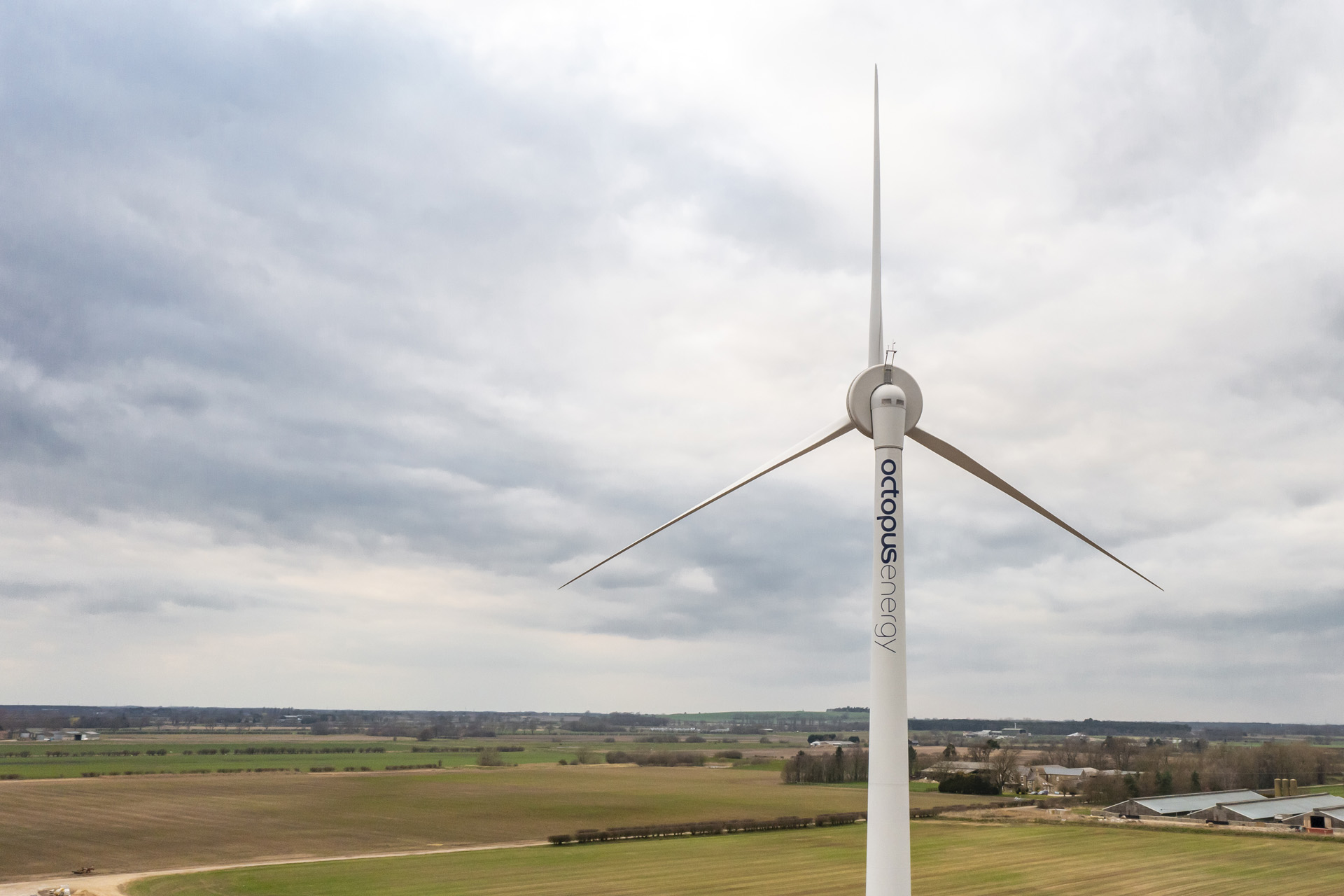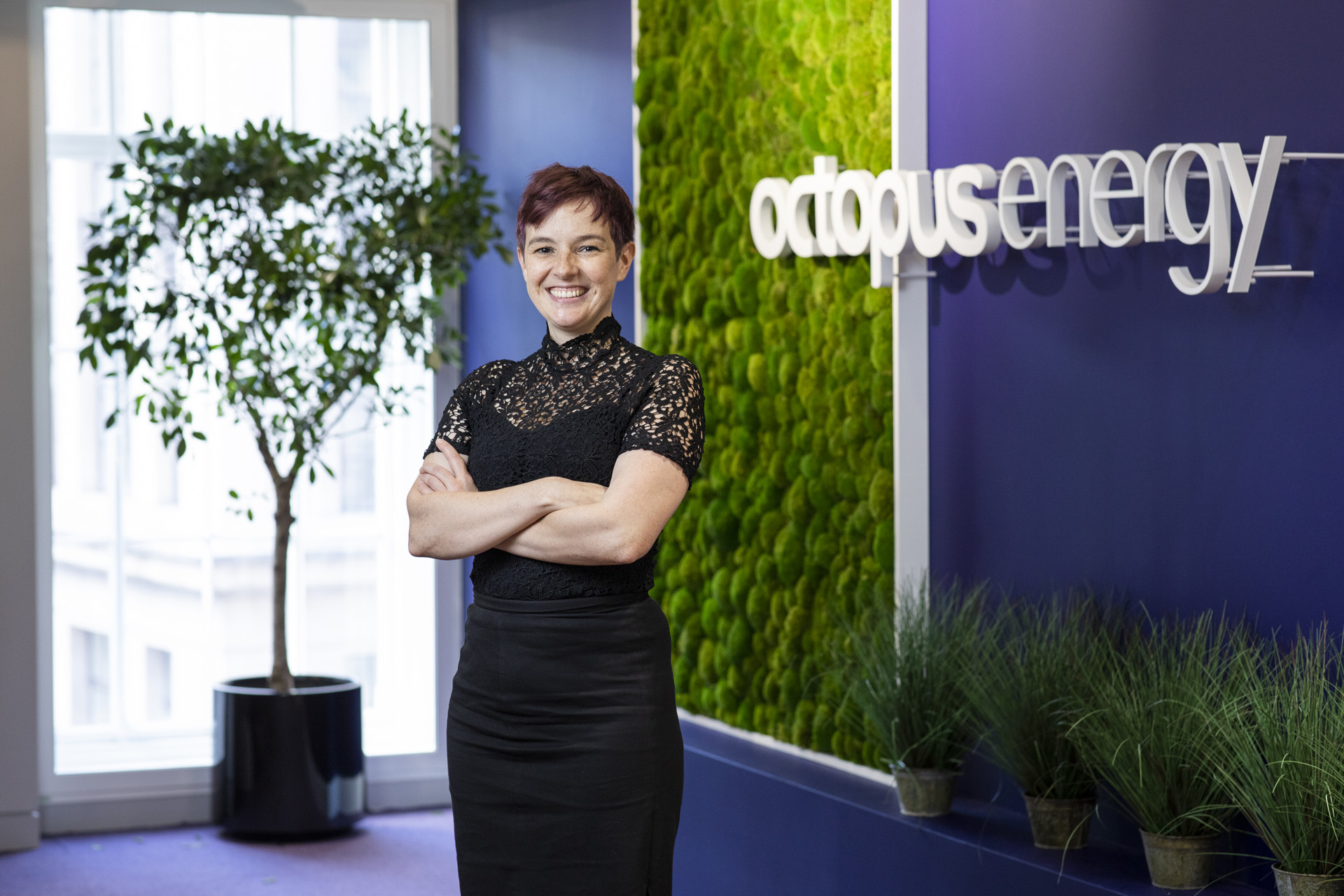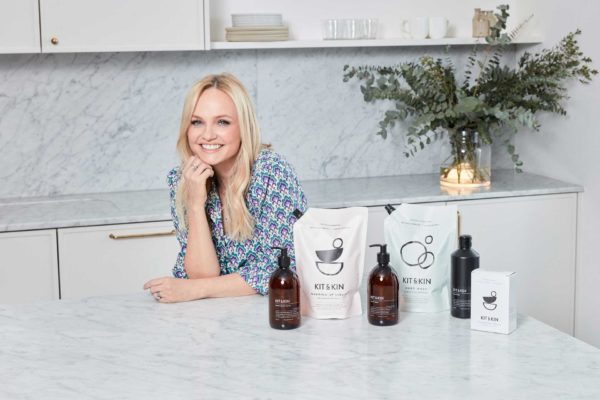‘The Green Energy Revolution Will Be Bigger Than The Internet’: Rebecca Dibb-Simkin, Octopus Energy – Interview
By
2 years ago
Inside the green energy revolution

Octopus Energy is on a mission to change the energy industry for the better, with Chief Marketing Officer Rebecca Dibb-Simkin frontrunning the fight.
Green Heroes: Rebecca Dibb-Simkin, CMO for Octopus Energy

How does Octopus differ from other energy companies?
When you think of energy suppliers, the words slow and expensive might come to mind – you probably roll your eyes, too. People are used to bad service, expensive tariffs and hugely misunderstand their energy usage. That’s because the energy industry has been dominated and controlled by monopolies and outdated systems that prioritised dirty fossil fuels and left consumers in the dark.
Octopus launched eight years ago to change all that – and the energy industry as a whole, from introducing smarter tariffs all the way to investing in low carbon technologies to future proof our homes. Octopus wasn’t founded solely by energy experts: we’re a global business set up by entrepreneurs to spearhead the renewable energy revolution. We run on technology, not bureaucracy. We don’t just supply customers with energy and send a bill every month – we work with our customers to help them utilise their energy efficiently.
We’re thinking about every part of the industry and setting out to make it better – and we have to do everything because, if you try and do a little bit of a system, it doesn’t work. Through technology, we’re helping to drive the green revolution and reinvent energy as an interconnected power system that unleashes smarter, greener and cheaper energy for everyone. This is what makes us different from regular energy suppliers.
What are the climate facts that make you fearful?
This precious little blue rock is the only home we have. I really do mean ‘little’ by the way: the fact that you can drive a car from Earth to the troposphere (where the ozone layer starts) in just five minutes is both astonishing, but also scares me. That small shell of protection is what allows 8 billion humans to breathe – and we’re pumping it full of fossil fuel pollution. Transport emissions account for around 20 percent of carbon emissions. Home heating accounts for 14 percent. We’re addicted to the stuff.
How will our homes change in the future as low carbon technology is introduced?
Architects, designers and engineers are rethinking how our homes are built. That’s because they have to. In the UK, the Government’s 2025 Future Homes Standard requires all newbuild homes to be highly energy efficient and utilise low carbon heating. A brilliantly designed home isn’t enough nowadays – our homes need to be future proofed: smarter, greener, and to enable homeowners to understand their energy usage and play a part in reducing their carbon footprint.
We’ve started to work with house builders on what we call ‘Zero Bills’ homes. Someone who moves into a new build home fitted with green hardware (a heat pump, solar and a battery) optimised by our software platform, Kraken, will pay zero energy bills for at least five years – guaranteed.
‘Zero Bills’ is a world first. But the truth is, it needn’t be. It’s perfectly simple to build green homes with no bills, because the big secret is, green energy is no longer a premium product and so much of the tech we need to save ourselves is there for the taking.
Heat pumps use electricity to heat homes instead of burning gas. They’re massively popular in the Baltics (where the weather is, well, Baltic) because they’re so incredibly efficient: up to four times more than their gas counterparts. Football clubs like Arsenal have batteries capable of storing enough green power to play entire matches off-grid, and an electric car can store enough energy to power an average home for over a week. And there’s solar power. If we covered a patch of desert as small as 10,000 square miles with solar panels, it’d be enough to power America (or, if we covered 1.2 percent of the Sahara, we could power the entire world). It really is that easy.
Greener homes aren’t just good for the planet, they’ll end the worry and cost of bills altogether. Now, the rallying call is on developers and architects to build homes which use green tech (and yes, it really is that simple). We’ll do the rest.
When was your green lightbulb moment?
Two years ago, I met former US Vice President Al Gore. He told me ‘tech will save us’. And it has – from the annals of history when we first sparked fire, through the agricultural and industrial revolutions, and more recently to the breathtakingly fast development and roll-out of the pandemic-curbing Covid-19 vaccine. A new application of the humble QR code even helped us nervously step back out to pubs.
Mr Gore’s comments really stuck with me. It made me realise our reliance on technology if we want a greener and smarter energy future. He was right – technology has proven to help humans in ways we could never achieve on our own. And, with energy, the technology we need to change the industry and future proof our planet exists today. It’s not about if we prioritise it, it’s when. We need to lessen our reliance on old practices and move toward an electrified future, where green technology powers our home, not dirty fossil fuels.
What green business practices are you most proud of?
I’m proud that, at Octopus, sustainability is embedded in our every day. Be it supplying customers with green energy, launching smart products like electric vehicle tariffs or installing solar panels on people’s roofs, the work our employees do leads back to sustainability. But, more than that, in our office we’ve created an environment where we’re also putting sustainability front of mind.
We’ve created a collaborative workplace for employees to thrive, and each of our offices (we have dozens around the world) are encouraged and supported to implement their own sustainable solutions. Recycling and buying ethically might be 101, but it’s part of our culture that employees are enabled to make their own decisions. Some might choose to only source local products to use in the office, others to minimise business travel not on public transport. One office recently ran a ‘Clothes Swap’ scheme where team members brought in five items of clothing they no longer wanted and took five ‘new’ items home.
At a bigger business level, we decided to go one step above the familiar cycle-to-work scheme and launched an innovative salary sacrifice scheme for electric cars, a benefit our own employees get to enjoy. Through Octopus Electric Vehicles, the scheme allows drivers to save between 30-40 percent every month on the cost of a brand new electric car. This was an exciting initiative to launch, and something we’re also licensing to other companies so that their employees too can benefit from the scheme.
How do you avoid greenwashing?
Octopus Energy provides 100 percent clean electricity and is among the companies doing the most to drive green energy. Our cleantech software Kraken unlocks the green grid, with over 35 million accounts in energy companies round the world supported already. And we’re aiming for 100 million by 2027. We will move the whole world to cheaper, greener energy, or die trying. Everything we do at Octopus leads back to our mission to transform energy globally, faster and cheaper than anyone imagined. That is where our focus is and has always been, so everything we do at Octopus is underpinned by this mission.
We aren’t setting out goals that are unachievable, or announcing initiatives that don’t mean anything. Our work, our projects and our businesses all lead back to our mission, so there’s never an opportunity to greenwash or do something just for the sake of it. It’s that simple.
What can other companies learn from Octopus?
The green energy revolution will be bigger than the internet. The key to unlocking the full potential of renewables is through a smart, dynamic, interconnected power system that works just like the Internet – fueled by technology.
We hope to inspire other companies with our commitment and investment in technology. The people who built Uber didn’t come from a minicab background. Elon Musk went from fintech, to space engineering, to Tesla. And yet, these two companies have undoubtedly changed not only their industry, but the world – for the better.
If we were to reinvent the energy system today, it’d be founded by technology experts. This is how we think at Octopus, and how we think all companies should think when looking to change their industry. Technology is an incredibly powerful force that we have the privilege of accessing, and there are plenty of examples, Octopus included, of how it’s enabled to improve industries.
Amid the energy crisis, what are the unique challenges the energy industry is facing, and how is Octopus tackling them?
The way our energy system works is outdated. While, right now, the price of a green kilowatt hour is less than the cost to produce a brown kilowatt hour, the price of the most expensive power hooks the price for all, so it’s harder for the cost benefits of green energy to rise to the surface. The grid networks that manage energy distribution were designed many years ago to import energy from a few hundred ancient fossil fuel plants. People sit in control rooms and switch dirty power plants on and off according to predictable patterns of energy demand – when people use a bit more power, they switch on another power station, and off when they don’t need it any more. It’s harder to fit renewables into that rectangular world.
At Octopus, we’re facing that challenge by pairing hardware like heat pumps with software like our cloud based platform, Kraken, which automates the energy supply chain, optimises customer service, and drives the smart grid by giving customers access to energy when it’s cheapest and greenest. The platform ties together the whole energy system and unlocks the cheapness of renewables for all.
The technology is here right now and, if we act fast, it could save us from the very worst consequences of climate catastrophe. It’s not just a planetary benefit, it’ll make everything cheaper, too. Across Europe, we’re in the grip of an energy crisis, driven by a global market wedded to the production of fossil fuels. The government has spent billions trying to keep prices down. People are paying three times what they were a few years ago to keep their families warm, when they should be paying less for using ever-greener electrons.
If the tech we need is there and it would save money, what’s taking us so long? Although humans are smart, kind, curious and inventive, as a mass, we can be pretty resistant to change – or often simply can’t imagine the alternative. We like what we know. An often quoted line dubiously attributed to Henry Ford on developing the Model T car goes: ‘If I had asked people what they wanted, they would have said a faster horse.’
What makes you feel positive about a sustainable future?
There is a true sense of togetherness when it comes to fighting climate change and reaching net zero. And it’s not on a local level – there’s a global movement happening where business leaders are prioritising sustainability; summits and events like COP are becoming more and more important for global leaders to come together and make impactful decisions. There’s no doubt that, on a global level, there’s a sense of urgency.
At Octopus, we found that by working together we can make a change more quickly. It’s really important companies don’t just sit on what’s at arms reach. There’s potential on a global scale to partner and make impactful change. We’ve experienced this first hand by working with international partners: in Morocco, we agreed a deal with Xlinks, the company building the world’s largest subsea power cable to deliver renewable energy from Morocco to the UK; in the UAE, we’ve partnered with global renewables developer, Masdar, who’ll use our Kraken platform to flexibly manage batteries; in Europe, we’re opening new wind farms to generate carbon free electricity.
Having global companies come together is a good thing. The more people, partners and governments on board will help quicken the road to net zero.
Who is your own green hero?
Probably not in the spirit of this, but it has to be my kids. I’ve got four, and I’d like to leave a world to them that they can leave to their children’s children. There’s no better sharpening of the mind when it comes to sustainability than the fact that you’re doing this for your descendants, not for you.
Name three of your favourite companies who are doing the right thing, and why do you like them?
Twinings Fragrances: I am a huge fan of anyone who runs a small business, with tight margins, and still decides to do the right thing. Mum Carrie set up Twinings Fragrances to create high end but affordable candles. She plants a tree for every order made, encourages recycling (you can take your old jar to get it refilled), reduces her (already mainly recycled) packaging, and regularly attends local charity events to help raise funds and passionately supports other small businesses locally. It just shows how everyone really can make a difference.
Patagonia: Last year, the company’s founder, Yvon Chouinard, decided to transfer his ownership to a non-profit organisation, instead of selling the company and taking it public. Not only is it known for its sustainable practices – Patagonia has been a B Corp since 2011 – but I was inspired by their founder and his decision-making last year. It’s an example of a company doing good for the planet, whilst also balancing a sustainable culture.
Airbnb: An obvious one, but you can’t ignore the incredible transformation Airbnb has had on travel. I’m fond of how Airbnb’s founders weren’t hoteliers but, through technology, they were able to launch a business that made travel easier for consumers, and offer an incredible array of services and experiences. I really believe that Airbnb has the consumer at the front of their mind, and that’s one of the reasons they’re so successful. A brand that’s loved by many.
Should we be green shaming the companies who are doing nothing to change their ways?
Time is of the essence – in our day to day, but also for the future. We’re at a critical point where if we don’t get our ducks in a row and prioritise a sustainable future, our planet won’t survive. We want to spend less time focusing on what other companies are not doing right, and more time focusing on the priorities of our business, and how we can future-proof our world.
What are the biggest challenges in running a sustainable business?
Business leaders are becoming increasingly aware of how to balance the wellbeing of their employees whilst also helping to protect the planet. There are companies that are mission-driven, but don’t necessarily have a sustainable culture or look after their employees. On the other hand, there are organisations that aren’t exactly changing the world for the better, like gambling, but are brilliant places to work.
The challenge is getting the balance right between employee wellbeing and doing good for the planet. Having a sustainable mission is one thing, but it’s crucial the mission is embedded into the company’s culture, and becomes a crucial part of the brand’s identity and purpose.
There are sustainable practices companies can adopt which are an easy way to become more sustainable, like implementing zero-waste policies and recycling schemes. But it’s important for companies to go a step further than paper cups and shredders. At Octopus, we’ve implemented policies and practices that promote fairness for our employees, no matter their role, experience or background. This includes promoting fair and equal pay for men and women.
What advice can you give to other businesses who are wanting to do better?
There’s no doubt everyone is grappling with the challenge of net zero. Companies wanting to do better are realising the amount of time and effort needed – not to mention the jargon and confusion about what’s right and wrong.
The best thing to do is lean on others and collectively help each other. By joining forces, we can make faster progress to net zero. No one should go through this alone – everything that goes with net zero is hard to understand and navigate. By supporting each other, companies will have access to help and guidance on what they need to do and how to do it.
Is there anything that you encourage your customers to do to support your sustainability efforts?
It’s a strange one: we’re an energy company and ideally, we want our customers to use less energy. This year, nearly a million of our customers earned money by using less energy in peak times (when more strain on the grid typically means we’d otherwise have to burn extra fossil fuels). We’ve paid those customers over £5 million, money that would have usually gone to fossil fuel extractors instead. How much simpler, and fairer, to pay people to use a bit less. And guess what? People love it, too. When was the last time a family game night, a quiet evening with your nose in a book or a twilight walk earned you a few bob?
What are three things we should all, as individuals, be doing to help in the climate change fight?
Ensure you’re getting renewable energy to power your home. Octopus can help you with that, of course.
Have a learning mindset. There’s huge amounts of information out there on how to be sustainable, what to buy, what to wear and how to eat. I think it’s important for people to spend time reading and learning, not just follow trends. Understanding what your carbon impact is and how you can change it to suit your lifestyle is really important and will allow you to set realistic goals that work for you.
Make sustainable decisions. Need a new car? Buy an electric vehicle. Want to redesign your home? Install efficient, low-carbon devices such as heat pumps. These aren’t choices people would make every day, of course, but it’s important to consider whether your decision can be a sustainable one. I reckon 99 percent of the time, it can be.
Discover more at octopus.energy






